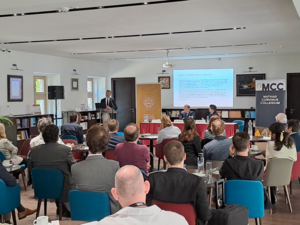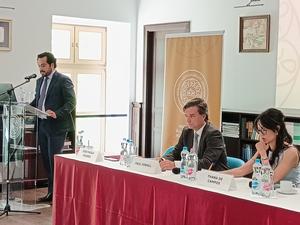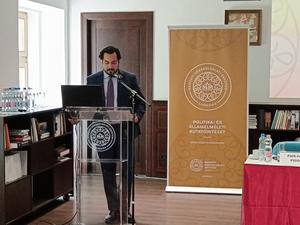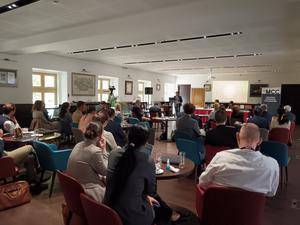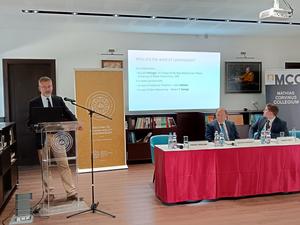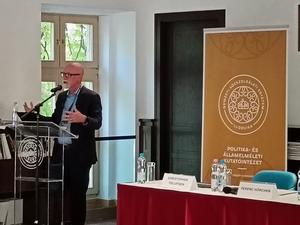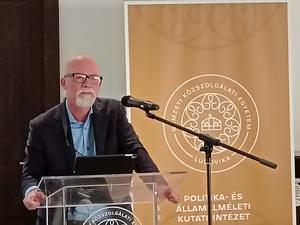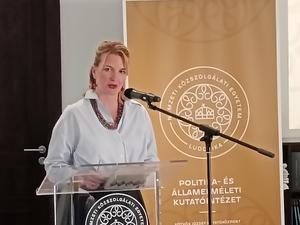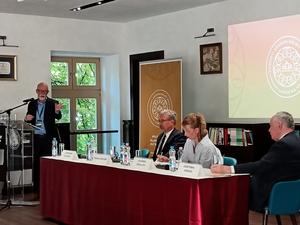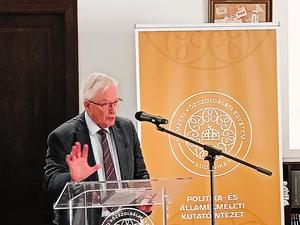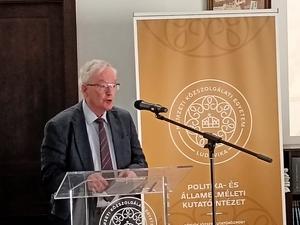On 18‒20 September 2024, an international conference was held in Budapest, organized by the Research Institute for Politics and Government of the Eötvös József Research Centre at the Ludovika University of Public Service in cooperation with the MCC Center for Constitutional Politics. Members of the organizing committee, Johanna Fröhlich (Ludovika UPS), Ferenc Hörcher (Ludovika UPS) and Kálmán Pócza (MCC) were aiming to create an academic space in which some of the most important legal and philosophical problems of today’s society would be discussed in light of contemporary analytical natural law, and to foment the dialogue between two unique philosophical and cultural contexts, the continental and the common law traditions.
The event started with an Early-Career Scholar Forum, that provided opportunities for members of the younger generation to present their research related to the contemporary relevance of the philosophical and legal tradition of natural law. The first full day of the conference, held at MCC, consisted of three panels discussing the conceptual questions of natural law jurisprudence and its relation to the specific issues of human life, religious liberty, and family, where renowned scholars from British, American, and Chilean universities presented their papers on relevant topics like the relation between modern analytic Thomism and the idea of the Good, the concept of “unselfing” in the writings of Iris Murdoch, the conditions enabling the flourishing of mothers in contemporary societies, and a case-related assessment of the tension between the sanctity of life and contemporary jurisdiction.
The relevance of the conference was highlighted by the participation of one of the most outstanding representatives, in fact the living legend of contemporary analytical natural law scholarship, John Finnis, professor emeritus of the University of Oxford and the University of Notre Dame, who held the first keynote speech with the title Natural Law Theory and Today’s Problems: Nine Pools of Light. In his seminal and thought-provoking lecture, Prof. Finnis embarked on an all-encompassing analysis starting from the very beginning of the universe and reached the final aims of the human condition. In accordance with the language of the Bible, he underlined that the truth of natural moral law is written in the heart of every human being, who have the freedom to follow or reject it. Regarding today’s problems, Prof. Finnis expressed his views on how a false concept of the public good based on erroneous expertise led to government measures that violated the natural moral law during the pandemic. He also pointed out the immorality of the enforcement of a “net zero” goal, which, in his opinion, would cause significant harm without mitigating the risks of climate-change, and warned against misleading views on AI, as well as against the consequences of its irresponsible usage.
The final day of the conference took place at our campus, of the Ludovika University of Public Service. Leading scholars from abroad and Hungary discussed their views on human rights adjudication, natural law and political philosophy, delivering relevant insights into topics such as the international law and ius cogens norms, subsidiarity, the relevance of the philosophy of Elizabeth Anscombe for Finnis and the New Natural Law school, and the crisis of Western civilization encoded in liberal ideology. The second keynote speaker of the conference, Christopher Tollefsen, professor of the University of South Carolina discussed the possible foundations of a natural law ethics of persons with disabilities, an urgent but neglected issue in the practical implementation of natural law theory. Prof. Tollefsen stressed the ethical commitment to providing the best possible care for disabled persons and ensuring their access to social interactions, play, work, to religious and aesthetic experiences and activities in order to enable them to flourish as human persons with natural dignity. The discussants of this lecture also raised awareness of important aspects of this topic, such as the need to include caretakers of disabled children in the discussions of the issue within natural law ethics, and the mutual benefits of helping persons with disabilities. The conference was closed with the final reflections by Prof. Finnis, enriched with his personal recollections on the origins of new natural law theory and with his insights into its connections with virtue ethics.
Kálmán Tóth
research fellow
Ludovika UPS, EJRC, Research Institute for Politics and Government
